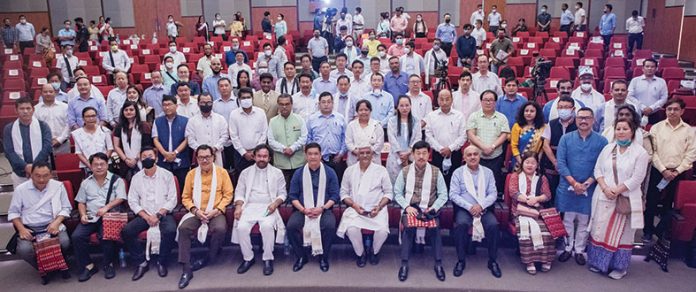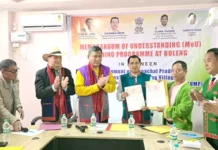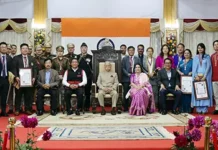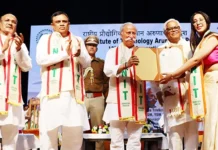DCs urged to focus on projects’ sustainability
NAMSAI, 24 Sep: Chief Minister Pema Khandu said that implementation of government schemes at the grassroots level mostly depends on the deputy commissioners (DC) as they are in the best position to know the challenges and potentials of their respective districts.
“Challenges and potentials differ from district to district. The DCs are in the best position to know the challenges and potentials of their respective districts. So you have to be innovative and take your own decisions best suited for your district. Don’t wait for government directives all the time,” Khandu said during the opening ceremony of a two-day conference on sustainable development goals (SDG) here on Friday.
The chief minister said he has full confidence in the capabilities of the DCs, which he said gives him the confidence to set deadlines whenever required.
“I accept challenges because I have full confidence in you,” Khandu said, addressing all the 26 DCs.
He reiterated that, while the country is set to accomplish the Jal Jeevan Mission (JJM) by 2024, Arunachal Pradesh has taken it upon itself to complete it by 2023.
“Now it is up to you to make it happen,” he said to the DCs.
Informing that the state’s cumulative score of SDG has increased from 51 in 2018 to 60 in 2021, Khandu, however, said that the score needs to be improved to achieve the goal on time.
Khandu suggested focusing on four sectors – tourism, agriculture and allied sectors, hydropower and natural resources – during the conference, and on chalking out a roadmap to harness these potentials viably, without harming the environment.
He requested the commissioners and secretaries headed by the chief secretary to discuss all government programmes and policies and the role the DCs can play in successfully implementing the programmes and policies.
The chief minister said that he would sit through the two-day conference along with his cabinet colleagues, most of whom were expected to arrive here by Friday evening. NITI Aayog CEO Amitabh Kant will also join the conference via videoconference on Saturday.
Deputy Chief Minister Chowna Mein requested the DCs to “focus on the factors that will ensure sustainability of projects developed by the government,” saying that many infrastructures created by the government get damaged sooner or later due to various factors.
Mein said that most of the government infrastructures created during the NEFA days are now in dilapidated conditions due to years of wear and tear. He said that a proposal has already been sent to the Centre by the chief minister to provide a one-time special fund for replacement or reconstruction of the obsolete infrastructures.
Stating that the state government has made several reformations, including administrative and financial, Mein said that plans are afoot to “bring in more financial reforms with regard to movement of files for financial concurrence by shortening/fast-tracking the process.”
He expressed hope that the DCs would “focus more on their monitoring mechanism from the SDG perspective.”
“The institution of the DCs continues to play a vital role in convergence and monitoring of all developmental activities in the state. The DCs as team leaders should encourage and motivate their officers to ensure that the districts’ targets are aligned with the SDGs. It is when the global SDGs are localized into district-specific targets that we will be able to achieve our commitments to the international community,” he said.
Speaking on border area development, the DCM said the DCs have a great role to play in the matter.
“During the last few years, we have witnessed phenomenal developmental activities in the border areas and we propose to accelerate the pace by providing better connectivity, good water supply and electricity and better health and education infrastructure. We will be developing a series of model villages all along the international borders and will take up standalone micro-hydels near the international borders,” he said.
On the tourism sector, he said it is going to be a game-changer in Arunachal Pradesh and would contribute immensely to income generating activities.
Highlighting the state’s hydropower potential, the DCM informed that the state has taken a “conscious decision” to allot more and more projects to the CPSUs.
“Recently we allotted Nafra and New Melling projects to the NEEPCO and we are working on many more projects to be handed over to CPSUs,” he added.
He also spoke about the huge potential of the state’s agriculture and allied sectors, stating that “four agricultural climatic zones make it favourable for cultivating different crops in the state.”
The inaugural session was also attended by Jal Shakti Minister Gajendra Singh Shekhawat, DoNER Minister Kishan Reddy Gangapuram and Lok Sabha member Tapir Gao.
A day earlier, Reddy inaugurated a 2.70 mld capacity integrated water supply project for Chongkham, declared “full saturation of Chongkham block under the JJM,” and dedicated 303 completed schemes under the JJM to the people of the state.
The Chongkham project will benefit about 39,000 people, with a total of 3,793 households, 44 schools and 103 anganwadi centres, including all religious places, community halls and other institutions. (CM’s & DCM’s PR Cells)




